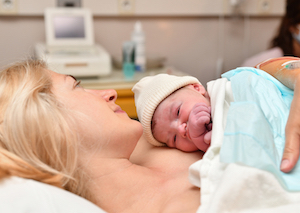 Every industrialized country in the world has a maternity leave policy of 12 weeks or more, except the United States.
Every industrialized country in the world has a maternity leave policy of 12 weeks or more, except the United States.
A new study published in the Harvard Review of Psychiatry looked at the impact of paid maternity leave on the mental and physical health of mothers and children.
“In our literature review, we were hoping to understand whether prior work indicates physical and/or mental health benefits for the mother and child,” study author Christina Mangurian told us. “As a group of predominantly psychiatrists who understand the important bonding that takes place early on in an infant’s life, we hypothesized that we would find a mental health benefit.”
Postpartum depression affects up to 20 per cent of mothers in the U.S. and 10 per cent of partners.
“We chose this study topic because there had not been a prior review of the literature in this area,” Mangurian told us. “As physicians and mental health providers, we were ideally suited to review this area.”
According to the Organization for Economic Cooperation and Development (OECD), over 72 per cent of mothers work part or full time in the U.S. Nearly 50 per cent of families with two parents have both parents working. Within ten days of giving birth, 23 per cent of mothers must return to work to pay the bills.
“We conducted a narrative literature review of 26 national and international studies, and consolidated findings,” study author Nick Riano told us. “We determined that paid family leave reduces rates of infant death and postpartum depression, and increases secure attachment, breastfeeding, and vaccination rates. We also noted a ‘two-tiered’ system of leave in which lower income mothers are often unable to or deterred from taking leave after childbirth.”
Even though Americans are living longer lives, living to an average age of 78.7 years, infant mortality rates in the U.S. are high. An average of 22,000 infants die in their first year of birth. Mississippi has the highest infant mortality rate in the U.S. Massachusetts has the lowest rate. Reasons for death include sudden infant death syndrome, congenital malformation, suffocation, preterm birth, and pregnancy complications. Black babies die more than any other race in the U.S.
Estonia has the lowest infant mortality in the European Union and offers 18 months of paid parental leave while Japan, Lithuania, Latvia, Norway, Hungary Austria, Slovakia and Slovenia offer a year of paid parental leave.
“We were not surprised with the results,” Mangurian told us. “It validated our hypothesis.”
Though the U.S. doesn’t have a maternity leave policy, there are states that do including Washington, Rhode Island, California, New Jersey, New York, and the District of Columbia.
“I think we added to the literature about the benefits of paid family leave,” Mangurian told us. “These mental health benefits to mother and child are very important for policymakers to consider.”
There were 3.79 million live births in the U.S. in 2018. The metropolitan area with the highest birth rate was Hinesville, Georgia. Montana had the highest number of home birth rates, followed by Wisconsin and Utah.
“Paid leave policies exist in all other developed countries,” Riano told us. “The fact that the United States does not yet have such a program is increasingly troubling given that the data suggests mental health benefits for mothers and their babies.”
Patricia Tomasi is a mom, maternal mental health advocate, journalist, and speaker. She writes regularly for the Huffington Post Canada, focusing primarily on maternal mental health after suffering from severe postpartum anxiety twice. You can find her Huffington Post biography here. Patricia is also a Patient Expert Advisor for the North American-based, Maternal Mental Health Research Collective and is the founder of the online peer support group - Facebook Postpartum Depression & Anxiety Support Group - with over 1500 members worldwide. Blog: www.patriciatomasiblog.wordpress.com
Email: tomasi.patricia@gmail.com